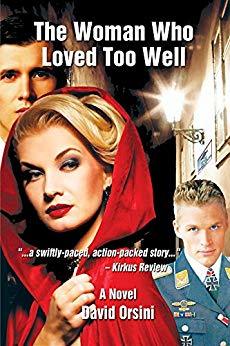 SEVEN SUMMERS |
 Discover May's Best New Reads: Stories to Ignite Your Spring Days. |

Purchase
Author Self-Published Romance Suspense Excerpt of The Woman Who Loved Too Well by David OrsiniMarc and Jean-Claude Marc glared at his squadron leader. Though he had always liked him before, he positively loathed him at this moment. “Do you know what you are saying?” His staccato inflections turned the question into an accusation. “Jean-Claude is alive, and we are not going to do anything to save him.” The major eyed him directly. He was a tall, vigorous man whose ruddy Marc understood all these things. He was also aware that Pelletier refused to pity himself and that he refused to pity others. When he answered him, Pelletier spoke matter-of-fact words that set before him once again the dilemma facing them. “There is nothing we can do to save Jean-Claude. A commando raid against the Germans who captured him might have worked, if they hadn’t moved him to a new prison. We don’t know where the Germans have brought him. Believe me. We have done all that we can. There is no way to free Jean-Claude.” His dispassionate words did not keep Simone from urging him to see their problem differently. “Yvan, this is not like you. You have never before refused to help a pilot in your squadron. There has to be something more that we can do.” On this January afternoon in 1942, they were sitting in a booth within a shadowy corner of the pub that stood a half-mile away from Marc’s and Pelletier’s air base in Lincolnshire. On any other day, Major Pelletier would have perceived Marc and Simone as one of the many romantic couples in the room. Marc Roussillon was tall and dark- haired, and his big-boned physique and manly grace suggested that he was a well-trained athlete. Marc’s brown eyes met him directly and drew him into their steely regard. Pelletier well understood that an encounter with this twenty-two-year-old pilot involved quickened awareness and subtle calculations. If he were to ask him to describe his scanning impression of the place where they were meeting, Marc would have offered an accurate location of entrances and exits, of the eight persons seated nearest those exits, and of the man and woman who were dining at the booth next to theirs. If their meeting were less fraught with tension, Pelletier would have—even in this dark period of his life—allowed himself to admire more than an instant the poise and decorum of Simone, Marc’s wife. She also was twenty-two. She was, besides being very young, one of the two or three loveliest women he had ever seen. Her blond beauty and delicate bones lent an ethereal expression to her manner. But her warm spirit and her confident inflections told him that she was very much a woman of this world. They had shared a torte filled with zucchini, eggplant, and tomatoes, as well as a few rounds of Glenmorangie scotch, pungent even with its caramel and vanilla textures. Called by Marc away from her father’s home in Sweden, Simone had made a special effort to join him here in England for this meeting with his squadron leader. Because Pelletier had always shown a soft spot for her, Marc hoped that her presence would draw Pelletier into a new plan for saving Jean-Claude. In the distance, smoky vapors rose and coiled about the crowded bar and about the wider spaces of the pub. The tangy fragrances of food—beef stew, cider apple chicken, trout braised in Riesling wine, and lemon sponge cakes—floated languorously into the vaporous atmosphere. French and British pilots in blue Air Force trousers and brown leather jackets were drinking whiskey, rum, and ale at the bar. Some of them were sitting at tables or in booths while eating lunch and making contact with old friends or new acquaintances. They were talking about the latest rugby matches or about hunting trips they had taken in South Africa or about the skiing they had enjoyed in the Swiss Alps before the war. Most of these men were partnered with pretty girls in colorful dresses who lived in the town and who liked the company of combat pilots. Caught within the cacophony of voices, Vera Lynn, Frank Sinatra, Betty Grable, and Edith Piaf were singing romantic ballads on jukebox recordings. Marc and Simone perceived all of this reality of people and fragrances and sounds. But they were aware of it as merely an oblique reference point that reminded them where they were and why they had come here. The reality that was far more pressing belonged to themselves as they continued to negotiate with Pelletier about the fate of Jean-Claude. When he heard Simone’s words that urged him toward a workable escape plan for Jean-Claude, Pelletier reflected upon them for a moment. Then, while his cold brown eyes observed her with the courtly respect that he subtly anchored to his otherwise stoical manner, he told her once again the harsh truth of things. “I know how much Jean-Claude means to you and to Marc. But, as valuable as he has proven himself to be, he is only one man among all the men and women who are fighting the Nazis. He is as important as you and I are, but no more than that. What has happened to him may happen to us. We knew that from the time we entered this thing. Our squadron won’t help win this war if we send our pilots and commandos into a rescue attempt that is bound to fail.” Marc refused to accept these words. “We’ve got to help him, Yvan,” he said. “We can’t let Jean-Claude die.” Pelletier answered him quickly. This time his voice carried a trace of bitterness. His curt intonations suggested that these would be his final words about the matter. “Forget about Jean-Claude. When it’s our turn to die, no pilots in our squadron will be thinking about us. They’ll be thinking about staying alive and stealing whatever pleasures they can from a world that loves nobody.” Just as swiftly as he had spoken, he swallowed the remaining drops of his scotch, threw his napkin next to the lunch that he had barely eaten, and rose—tall, brown-haired and formidable—to his full height. Then, bowing to Simone and brusquely patting Marc on his shoulder, he hurried away. Silence overtook Marc and Simone now, an austere presence that lingered as if watching them. Not even the raucous and hearty sounds around them dispelled this stillness that held them in its bond. It was a few minutes before Simone chose words that meant to encourage Marc. “We did our best,” she said. “Maybe, if he knew Jean-Claude as well as we know him, Yvan might have been willing to make a new rescue plan.” Marc answered her with new determination. “I’m not giving up. We’ve got to help Jean-Claude.” “How?” Simone asked. “How can you make the impossible happen?” “I’ll find a way. I’ll think of something.” Excerpt from The Woman Who Loved Too Well by David Orsini |
|
| |||
|
||||



 © 2003-2024
© 2003-2024